

How Do E-Books Change the Reading Experience? Bookends By MOHSIN HAMID and ANNA HOLMES Each week in Bookends, two writers take on questions about the world of books.
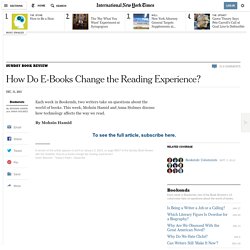
This week, Mohsin Hamid and Anna Holmes discuss how technology affects the way we read. By Mohsin Hamid In a world of intrusive technology, we must engage in a kind of struggle if we wish to sustain moments of solitude. Photo The advantages of e-books are clear. And yet the experience of reading e-books is not always satisfactory. Nonetheless, often I prefer reading to e-reading. I think my reasons are related to the fact that I have disabled the browser on my mobile phone. Similarly, I have switched my email account from the attention- and battery-consuming “push” setting to the less frenzied manual one. Time is our most precious currency. I crave technology, connectivity. In a world of intrusive technology, we must engage in a kind of struggle if we wish to sustain moments of solitude. Print Books vs. E-Books: What's the Future of Reading? A book a day keeps the doctor away.
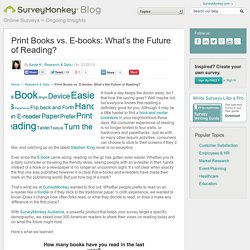
Isn’t that how the saying goes? Well maybe not, but everyone knows that reading’s definitely good for you. Although it may be a little harder to find a brick and mortar bookstore in your neighborhood these days, the consumer experience of reading is no longer limited to four walls, or hardcovers and paperbacks. Just as with so many other leisure activities, consumers can choose to stick to their screens if they’d like, and catching up on the latest Stephen King novel is no exception. Ever since the E-book came along, reading on the go has gotten even easier. That’s what we at SurveyMonkey wanted to find out.
With SurveyMonkey Audience, a powerful product that helps your survey target a specific demographic, we asked over 300 American readers to share their views on reading today and on what the future might hold. Here’s what we learned: Phew! And it’s a tie with half of respondents saying they buy in both formats. eBook vs. Print Book ... - Bookarma Blog. Guest post by Chris Robley, BookBaby The eBook Argument By now, most self-published authors understand the benefits of selling eBooks: low cost of entry into the marketplaceaffordable distribution that gives you worldwide reachno manufacturing costs per unit (beyond the initial design, formatting, and conversion)unlimited and eternal shelf-spacenearly instant delivery to your fanshighly portable and customizable reading experiencereadability across devices (tablet, smartphone, eReader, desktop, etc.)and much more But, believe it or not, there are still quite a few “holdouts” that refuse to offer their books in digital format.
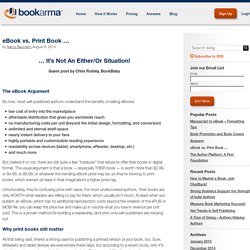
The usual argument is that a book — especially THEIR book — is worth more than $2.99, or $4.99, or $9.99, or whatever the trending eBook price may be, so they’re sticking to print books, which warrant (at least in their imagination) a higher price tag. Unfortunately, they’re confusing price with value. Why print books still matter.
Tablets vs. Textbooks - ProCon.org. Tablets help students learn more material faster.
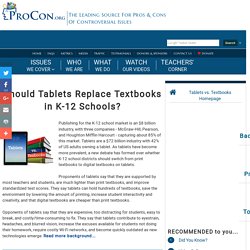
Technology-based instruction can reduce the time students take to reach a learning objective by 30-80%, according to the US Department of Education and studies by the National Training and Simulation Association. 81% of K-12 teachers believe that "tablets enrich classroom education. " The survey of technology in the classroom by the Public Broadcasting Service (PBS) also concluded that 77% of teachers found technology to "increase student motivation to learn. " Tablets can hold hundreds of textbooks on one device, plus homework, quizzes, and other files, eliminating the need for physical storage of books and classroom materials. The average tablet contains anywhere from 8 to 64 gigabytes (GB) of storage space. E-textbooks on tablets cost on average 50-60% less than print textbooks.
Tablets help to improve student achievement on standardized tests. Tablets contain many technological features that cannot be found in print textbooks. E-books v paper? Which do our brains prefer?
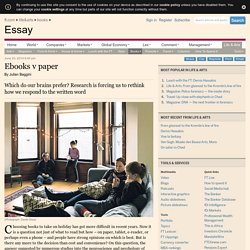
Research is forcing us to rethink how we respond to the written word ©Daniel Shea (Photograph: Daniel Shea) hoosing books to take on holiday has got more difficult in recent years. Now it is a question not just of what to read but how – on paper, tablet, e-reader, or perhaps even a phone – and people have strong opinions on which is best. There is no shortage of people warning of the risks attendant on the rise of “screen culture”, as the neuroscientist Susan Greenfield calls it. On the other side of the two cultures divide, the novelist and critic Will Self recently argued that the connectivity of the digital world was fatal for the serious novel, which requires all the reader’s attention. E-reading is certainly on the rise. Is this cause for concern? As researchers examine the differences reading in different media make, they are also having to distinguish carefully between the different things that we do when we read.